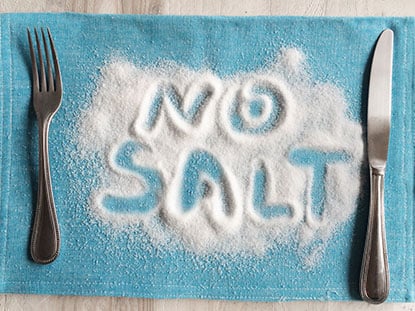Gourmet Salts: An SOS-Free diet eliminates both table salt and gourmet salts. Salts like Himalayan salt, Celtic salt, pink salt, French sea salt, Italian sea salt, kosher salt, smoked sea salt, black salt ('kala namak' in Hindi), Hawaiian sea salt and rock salt ('sendha namak' in Hindi) are called gourmet salts. The article Gourmet Salts: Myths explains that the chemical composition of gourmet salts is mostly sodium chloride, just like table salt.
Does Dr Greger encourage salt-free meals aka SOS-Free lifestyle? Yes!
SOS-Free Cookbook: The How Not to Diet Cookbook (256 pages, 2020) has no salt but uses miso for salty flavor.
Health conditions: Dr Greger has published many videos on the impact of sodium on several health conditions: Salt & Hypertension, Salt & Heart Disease, Salt & Cancer Risk and Salt: Asthma & Autoimmune Conditions.
Dr Goldhamer encourages an SOS-Free diet without any Salt, Oil and Sugar. He is the founder of TrueNorth Health Center in Santa Rosa, CA, which has conducted medically superized multi-day fasting for 40+ years.
An excellent article by Dr Goldhamer and Dr Toshia Myers: An Introduction to the Whole Food, Plant-Based, SOS-Free Diet.
At offset 0:03, Dr Goldhamer explains that oils are not healthy. At offset 1:14, he explains that salt is not healthy. At offset 4:12, he explains that even "raw, celtic, sea or Himalayan salts" are not healthy.
Dr Klaper discourages added salt. He worked alongside Dr Alan Goldhamer at TrueNorth Health Center for many years where an SOS-Free diet is encouraged.
3-min interview. Dr Klaper worked for many years at TrueNorth Health Center, Santa Rosa, CA.
Dr Peter Rogers is not fond of any added salts. He advocates a strict, "Spartan Vegan Diet" devoid of any salt, oil and sugar.
A fast-paced, information rich video explaining why we should avoid salt.
(highly recommended video) An important insight is shared by Dr Fuhrman in this video: if we adopt a Whole Food Plant-Based lifestyle but we don't cut down on our salt intake, then our risk for ischemic stroke ("heart attacks in the brain"; blood clot related) goes down but risk for "hemorrhagic strokes" (a different mechanism; blood vessel bursts) may go up! Thus it is important to do both: adopt Whole Food Plant-Based guidelines, and cut down on our sodium intake.
Dr Fuhrman talks about the relationship between stroke (ischemic and hemorrhagic) and sodium intake. He encourages us to do both: adopt Whole Food Plant-Based guidelines and cut down on our total sodium intake.
An informative video on salt history and sodium guidelines.
Dr McDougall doesn't insist on salt elimination. If we follow Low Fat, Whole Food Plant-Based guidelines, for example, the McDougall Diet, how much sodium do we get naturally from whole grains, beans, fruits and veggies (and small amounts of nuts and seeds)? Salt: The Scapegoat for the Western Diet (2008) by Dr McDougall explains:
Dr Doug Lisle and Dr Alan Goldhamer wrote The Pleasure Trap (225 pages, 2006).
Dr Lisle compares Dr McDougall's approach (small quantities of salt) and Dr Goldhamer's approach (zero salt), explaining that most people experience health benefits from Dr McDougal's approach; a few people with difficult health conditions may consider salt elimination under medical guidance. Dr Lisle himself adds a bit of salt to his meals, for an overall low sodium diet.
Dr Barnard discourages added salt.
Dr Esselstyn is okay with small quantities of salt added to meals. Excerpt from The Esselstyn Foundation's Plant-Based Jumpstart Guide:

 Instagram
Instagram YouTube
YouTube